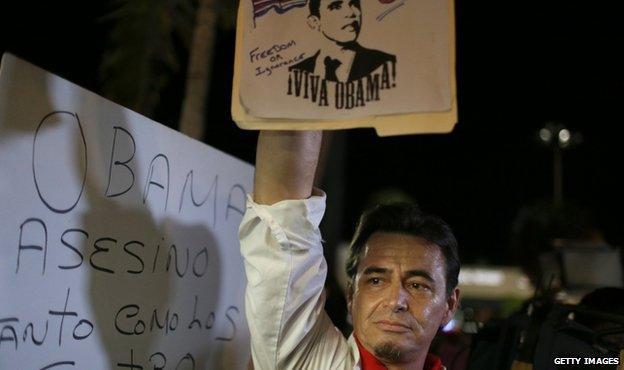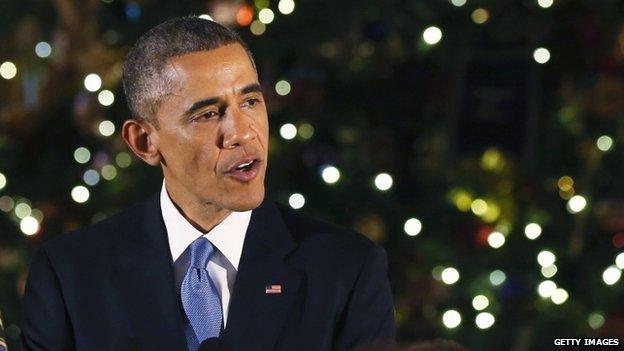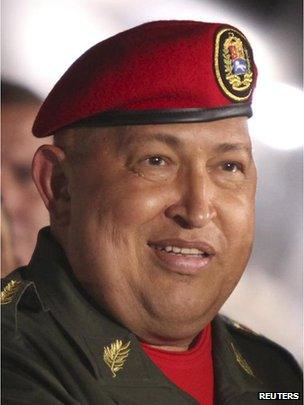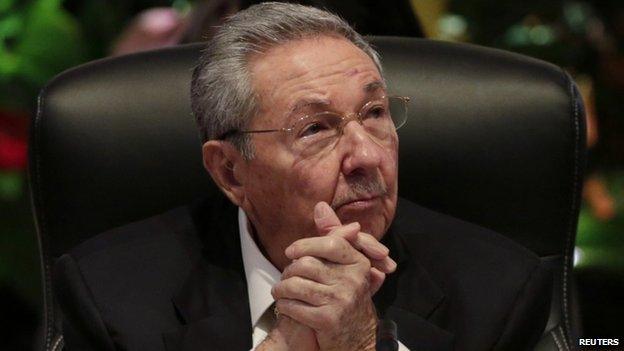Viewpoint: Obama secures legacy with Cuba policy shift
- Published

The policy changes lift restrictions on Cuba in place for more than five decades
With the speech outlining a major shift in US-Cuban relations, President Barack Obama secured his legacy in Latin America.
This was the speech most Latin Americans were hoping to hear from a US president for decades - and one many believed they would hear shortly after Obama came to office in 2009.
It took a lame duck session, a president unburdened by concerns about Florida politics, and a worsening economic situation in Cuba to produce the long-awaited change.
To be sure, Obama had already moved in 2009 to lift the restrictions on travel and remittances of Cuban Americans that had been imposed by the George W Bush administration in 2004.
Although those measures were welcome and had some effect, they were mainly on the margins and did not represent any fundamental shift towards engagement.
But on Wednesday Obama sounded a lot like the advocates for policy change on Cuba.

US President Barack Obama announced sweeping changes to US-Cuba policy on Wednesday
He did not just call for punishing Cuba less than before, but rather to end efforts to isolate Cuba diplomatically and squeeze it economically.
Obama made it clear that he is now committed to reversing course and opening up with Cuba in a meaningful way. That means pursuing expanded trade, communication and cooperation.
Although he still has to work within the legislatively mandated embargo, Obama has ample latitude and can build political momentum towards ending the anachronistic policy.
To realise the full potential of the new measures will, however, require some changes in Havana as well.
If the new US-Cuba policies will get the political backing in Washington they need to be sustained and succeed, there will have to be some indication that Cuba is taking steps towards greater political opening.
As the United States and Cuba pledge to normalise diplomatic ties, the BBC looks back at the relationship between the two countries through the decades.
If the regime cracks down, hardliners in the US Congress will have more ammunition to push back.
The new measures will test the long-held view that the Cuban leadership actually wants and needs the punitive US embargo to justify its absolute political control.
Removing that gift to the regime, the argument goes, will undercut its legitimacy and open things up.
While that view may well have been largely plausible when Fidel Castro was in charge, it is less persuasive in the current moment and under his younger brother Raul´s direction.
Raul Castro has presided over a series of measures of economic opening, including reduction of state employment and the spread of private businesses, but these have moved slowly and have had a number of difficulties, frustrating many Cubans.

Venezuelan President Hugo Chavez has supported Cuba financially
Although one can never be certain, having been in Havana over the last week there is a sense that, out of sheer economic necessity, the Raul Castro government would like to see more open and productive economic relations with the United States.
The Cuban economy is in dire straits and requires infusions of capital that will be hard to attain without significant US engagement.
Cuba's already severe problems have recently been aggravated by Venezuela's unrelenting economic crisis, made much worse by falling oil prices. Cuba has been heavily dependent on Venezuelan largess since Hugo Chavez came to power in 1999.
It is unclear, of course, whether the Obama administration's new measures will contribute to greater political opening and improvements in human rights in Cuba.
But few can argue seriously that the punitive approach, in place for over half a century, helped much on that score. Obama the empiricist believes that if a policy doesn't work it is time to try something else.
No policy, foreign or domestic, better fits that dictum. Also judging by the reaction on the streets of Havana, most Cubans too are relieved that the US-Cuba deadlock is over and could - though not easily or quickly - unleash some positive changes in their country.
Washington's absurd Cuba policy has long stood in the way of a more constructive relationship with Latin America. No issue has been such a powerful unifying factor across the region.

Cuban President Raul Castro discussed the sweeping changes to US policy with Mr Obama prior to their announcement
This bold move will not eliminate the growing distance between the United States and Latin America, but it is likely to help reduce the distance and open up opportunities for deeper engagement on a range of other issues.
When Obama attends the Summit of the Americas in Panama next April, and meets with his counterparts including Raul Castro, he is expected to be greeted with great warmth and enthusiasm.
Obama may discover that, as he looks across the global geopolitical landscape, with religious wars flaring, he may have more time for Latin America in his remaining two years in office.